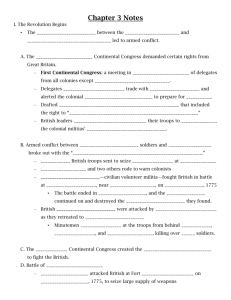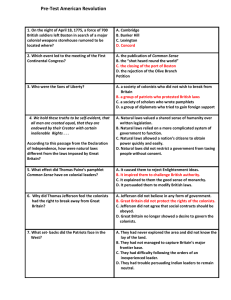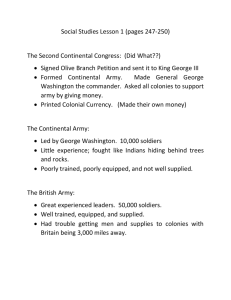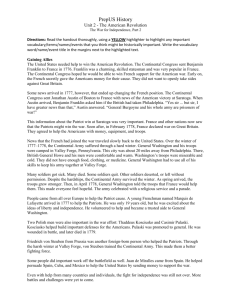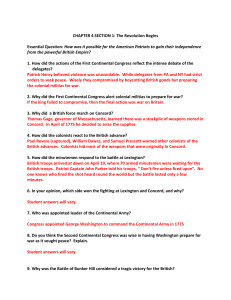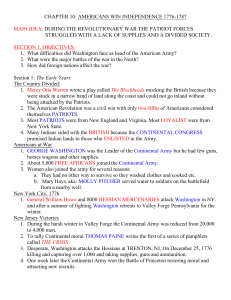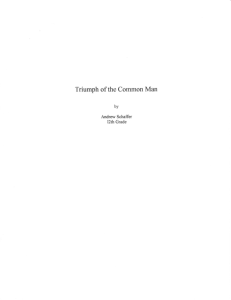Focus Question
advertisement
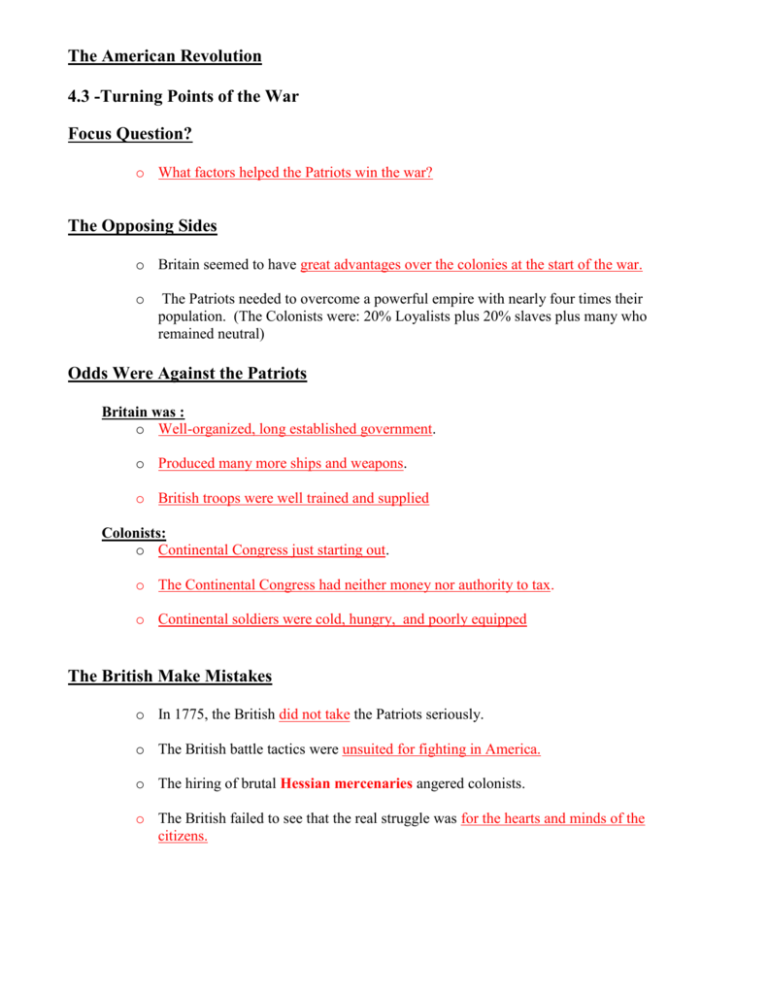
The American Revolution 4.3 -Turning Points of the War Focus Question? o What factors helped the Patriots win the war? The Opposing Sides o Britain seemed to have great advantages over the colonies at the start of the war. o The Patriots needed to overcome a powerful empire with nearly four times their population. (The Colonists were: 20% Loyalists plus 20% slaves plus many who remained neutral) Odds Were Against the Patriots Britain was : o Well-organized, long established government. o Produced many more ships and weapons. o British troops were well trained and supplied Colonists: o Continental Congress just starting out. o The Continental Congress had neither money nor authority to tax. o Continental soldiers were cold, hungry, and poorly equipped The British Make Mistakes o In 1775, the British did not take the Patriots seriously. o The British battle tactics were unsuited for fighting in America. o The hiring of brutal Hessian mercenaries angered colonists. o The British failed to see that the real struggle was for the hearts and minds of the citizens. Battle of Bunker Hill o British Commander William Howe made a costly mistake at Bunker Hill. o To show British invincibility he ordered a frontal assault up a hill on the Patriots. o The Redcoats first two charges failed but eventually they took the hill, but they suffered heavy casualties.(2-1) o The Patriots won a psychological victory. o In January 1776, Colonel Henry Knox arrived with cannons to reinforce the Patriots in Boston. o His men hauled the cannons 100 miles from upstate NY where Ethan Allen’s men captured them at Fort Ticonderoga o Patriots shelled both Boston & the Harbor, forcing the British to leave the city. British Misunderstood the Conflict o The British thought they were fighting a traditional European War. o They believe the Patriots would surrender if Lord Howe could defeat the Continental Army & capture major seaports, including Philadelphia. o The British actually accomplished these goals but still lost the war. The Patriot’s Strength o George Washington didn’t win many battles but he kept the Continental Army intact. o He only fought when conditions were favorable. o He inspired his men despite extreme hardship. o His small but committed Army hung together despite casualties, hunger, & disease. o Washington's Continental Army allowed local militia’s to suppress Loyalists in the countryside. Colonists Endure Hard Times o The Continental Congress could only pay farmers and soldiers with paper money (continentals), causing inflation. o The British blockade meant shortages of goods. Some profiteers sold items at inflated prices. o Washington’s troops spent the cold winter of 1777-78 at Valley Forge. There was disease and hunger; a third of the men were without shoes or coats. The War Shifts o The British under the command of General Howe capture NYC in Sept. of 1776. o 30,000 British & German troops devastated the continental army. o On Christmas night, Washington crossed the Delaware River surprising 1,000 German mercenaries at the Battle of Trenton. o This modest victory raised the spirits of the Patriots and kept the revolution going. Military Turning Points o At the Battle of Princeton ( 1777), Gen. Washington defeated Gen. Charles Cornwallis. o However, Washington suffered more defeats than victories in 1777 and eventually lost Philadelphia. o British General Burgoyne marched the British army from Canada into the Hudson Valley. o Falling into a Patriot trap at Saratoga, Burgoyne surrendered. o This victory suggested that the American’s might actually win the war. o This victory also helped to secure European allies. European Allies o Benjamin Franklin persuaded France to send supplies and, after Saratoga, troops and a navy. o French nobleman Marquis de Lafayette volunteered to help Washington. o Baron Von Steuben, a German, volunteered to train and drill Washington’s men in 1777. o The Spanish in New Orleans kept the British from entering the Mississippi River in 1779. Women Play an Important Role o Wives and daughters made blankets, clothing, and shoes for soldiers. o Some wives followed the men into battle, cooking, washing clothes, and maintaining the camp. o At Monmouth, Mary Hayes, known as “Molly Pitcher,” was said to have replaced her fallen husband at a cannon Continental Army Faces Challenges o During the winter of 1777, Washington's army survived horrible conditions outside Philadelphia in a camp in Valley Forge. o The soldiers suffered from a lack of supplies and food. Reports claim nearly 10,000 soldiers had no coats or shoes. Valley Forge o Despite the hardships, the soldiers improved from careful drilling by German volunteer, Baron Von Steuben. The Frontier War o Most Native American sided with the British who did not want their land, this made the war very difficult for the Patriots. o Colonel George Rogers Clark led a Patriot militia of roughly 175 men and French Allies took several British posts in the Northwest. o In 1779, the British and the Iroquois attacked outposts in northern New York. In 1779, the British and the Iroquois attacked outposts in northern New York.
